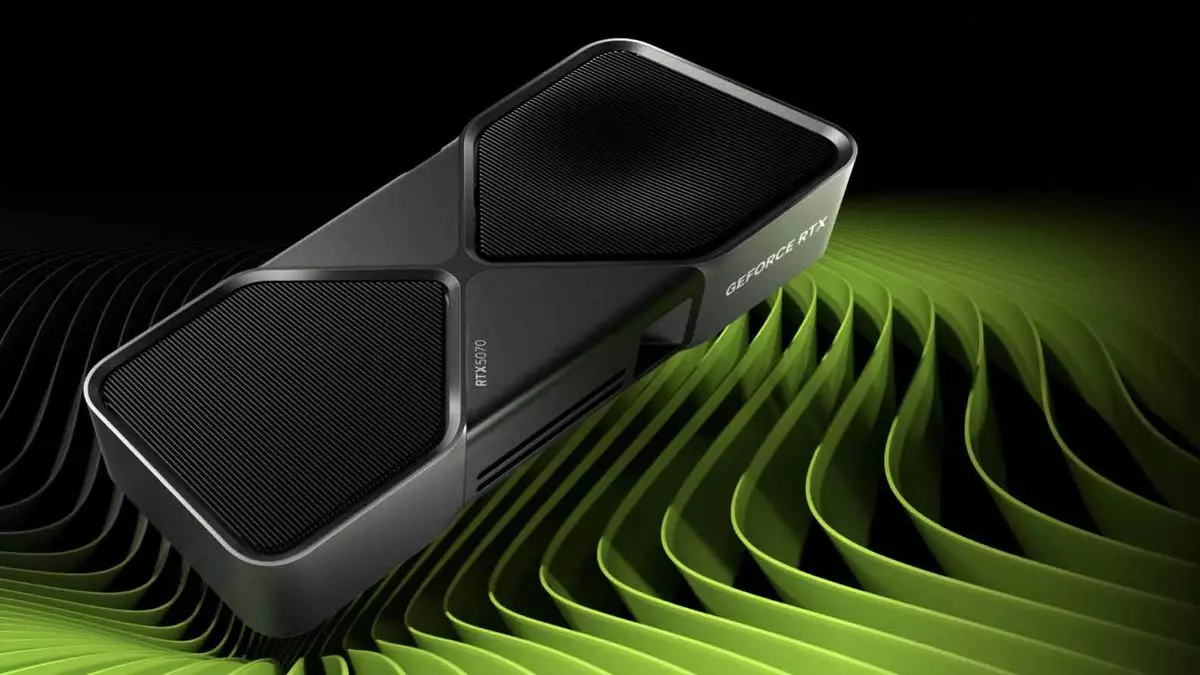The recent unveiling of the Nvidia GeForce RTX 5070 at CES 2025 has sparked considerable excitement in the gaming and tech communities. While it may be the least powerful of the newly announced 50-series GPUs, the RTX 5070 has garnered significant attention due to its ambitious claims of performance that rivals the higher-end RTX 4090. The anticipation surrounding this card begs the question: does the RTX 5070 live up to the hype, or is it an overzealous aspirant in the crowded GPU market?
Nvidia’s CEO, Jen-Hsun Huang, boldly claimed that the RTX 5070 would deliver “RTX 4090 performance at $549.” This statement is sure to stir interest among budget-conscious gamers who are searching for high-performance options without breaking the bank. Following the event, tech outlet PCGamesN had the opportunity to test the RTX 5070 in a side-by-side comparison against the RTX 4090 while playing the highly touted Marvel Rivals. The results were promising, with the new RTX 5070 reportedly achieving around 240 frames per second (fps), significantly outpacing the RTX 4090’s 180 fps.
However, such strong performance numbers raise questions about the conditions under which these results were obtained. The tests focused on a specific title that may have been optimized for the RTX 5070, which brings into focus the potential for the numbers to be misleading when applied to a broader gaming context. Is a gaming experience defined solely by framerate, or do other factors, such as compatibility and broader performance across a range of titles, play a crucial role?
A critical factor that contributes to the RTX 5070’s competitive performance is its integration of Nvidia’s DLSS 4 Multi Frame Generation technology. This feature uses advanced AI algorithms to generate additional frames between traditionally rendered frames, providing an impressive visual experience without a proportional increase in resource requirements. Nvidia has consistently emphasized the importance of AI and machine learning in modern graphics rendering, and this latest iteration seems to reinforce that vision.
Yet, it’s essential to recognize that DLSS 4 is not a universal solution. Its effectiveness is highly contingent on the game’s optimization for this technology. In many cases, particularly older or poorly optimized titles, the performance benefit may not be as pronounced, leading to a mixed experience for users across the gaming spectrum. Nvidia has acknowledged that the RTX 5070’s outstanding performance may not translate universally across all games, hinting at the proverbial need for gamers to manage their expectations.
The RTX 5070 is priced at $549, which positions it as a more accessible option compared to the RTX 4090’s lofty price tag. However, the introduction of features such as DLSS 4 raises further questions about whether consumers truly benefit from the suggested performance. If the performance gains are primarily seen in specific optimized titles, the cost savings may not correspondingly benefit the broader gaming experience.
In contrast, the RTX 4090, once a top-tier offering claiming prices exceeding $1,500, raises the discussion of how performance expectations have shifted with the new generation of GPUs. As it stands, if gamers primarily focus on newer titles featuring advanced AI capabilities, the RTX 5070 may indeed represent a compelling option. However, for those who wish to maintain competitive performance across a wider range of games, investing in a more powerful card may still hold appeal.
The Nvidia GeForce RTX 5070 has the potential to reshape the landscape for mid-range graphics cards, especially with its impressive performance claims and the integration of DLSS 4 technology. While it appears capable of delivering impressive numbers, particularly within well-optimized games, consumers are urged to remain cautious. It’s crucial to weigh the performance outcomes within the context of their entire gaming library and remain informed about the technology’s capabilities and limitations.
Ultimately, for those on the cusp of upgrading, the RTX 5070 presents a strong case for consideration. However, potential purchasers should keep in mind that the experience may vary significantly depending on the titles they wish to play and the nature of their gaming setup. In a world where every frame counts, informed decisions will undoubtedly lead to more fulfilling gaming experiences.

